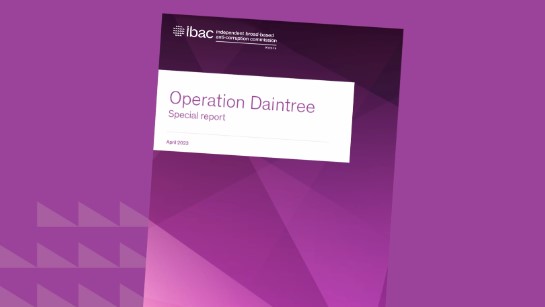When a government contracts with a supplier, it is vital that the choice of supplier is made in the public interest.
There is a range of legal and procedural safeguards to ensure that this occurs.
Those safeguards are especially important if a potential supplier has close links to the party in government.
IBAC’s Operation Daintree special report examines a case in which some of these safeguards were breached or overridden. It highlights concerns about the influence of ministerial advisors in the awarding of the contract and makes a series of recommendations to reduce the risk of such conduct recurring.
In 2018, the government had identified a need for frontline health workers to be trained to manage a growing problem of violence and aggression towards them.
Around this time, the Health Workers Union approached the government with a proposal to provide that training through an organisation called the Health Education Foundation - or HEF - which the union had recently established.
In October that year, the then Department of Health and Human Services signed a $1.2 million contract with HEF to provide the training. The department did so without going through a competitive procurement process.
Shortly afterwards, IBAC received a complaint alleging corrupt conduct in the awarding of that contract. In particular, it was alleged that ministerial advisors had pressured the department to award the contract to HEF despite relevant staff in the department having serious concerns that HEF did not have the experience or capability to deliver the training.
IBAC found that the evidence did not establish corrupt conduct as defined in Victorian law. Under Victorian law, conduct is corrupt only if it constitutes a criminal offence.
However, our investigation did substantiate the factual allegations that had been made.
Through its connection with the union, HEF was able to gain privileged access to ministerial advisors.
Ministerial advisors improperly intervened in the department’s procurement processes.
Senior executives within the department disregarded the concerns of their staff, failed to provide frank advice to the minister and allowed their perception of the minister’s preference to affect the decision to award the contract to HEF.
HEF failed to provide adequate training under the contract. When the department indicated its concerns about this, the union sought support from the Premier’s Private Office. An adviser in the Premier’s office then engaged with the Minister for Health’s office, who in turn improperly interfered with the department’s management of the contract with the HEF.
This investigation highlights the risks that can arise when a government is contracting with an organisation that has connections with the governing party.
Our report also highlights issues with the scope of authority and accountability of ministerial advisors; and the risks arising from failures of senior public sector officials to give frank – and potentially unwelcome – advice to their minister.
The report makes 17 recommendations on matters including: lobbying by unions and employer organisations; the obligations of ministerial staff and accountability for them; and the establishment of a Parliamentary Integrity Commissioner to deal with conduct which falls short of criminal conduct.
A detailed list of the recommendations can be seen on our website.
IBAC has asked the Victorian Government to report to parliament on the actions taken in response to these recommendations by the 31st of October 2023, with a further report on those actions due by the 30th of June 2024.
We will monitor the implementation of these recommendations and will ensure that Ministers, ministerial advisers, and senior public sector employees are aware of the integrity risks identified in our investigation.
I encourage you to visit our website to read the report and the recommendations in full.


